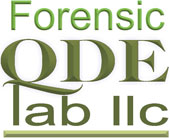Does your expert really cost that much?
Let’s face it, litigation is a pricey proposition for the average person. The time and money spent to take an injustice to court has become prohibitive for all but the most egregious of personal cases. The principals involved are often trumped by the practicalities of paying the attorney fees and having to suffer through exhausting delays and disappointments in the system. I can certainly understand why counsel is hesitant to introduce the added expense of experts for his client. And, I can even understand why the expert is chosen at the very last moment. But the truth is, an expert may be the very element in the case that will save time (and therefore money) for the client. Depending on the case, I have seen many settlements leveraged based on a well-executed expert evaluation and report.
Training or Experience
As a Forensic Document Examiner (FDE), my expertise does not evolve as a result of learning a trade and experiencing the ups and downs of the application of my skills. Such would be the case with most areas of courtroom experts like tradesmen, contractors or architects who testify about building defects, or doctors, nurses or psychologists who offer insight into standards of medical practice. In my area of expertise (as well as a few others), we are trained for the sole purpose of applying our knowledge and skills to the analysis of evidence in potential legal matters involving questions about the authenticity, source or authorship of documents. My only professional reason for being is to assist the court in determining the reliability of the evidence at hand. This places a well-trained FDE such as me, in the position of being an excellent team member and strategic consultant long before a potential court appearance.
Consultant Roles
By including the expert in the case early on, the attorney can gain insight into the value of the evidence and understand different ways of applying the value for his clients benefit. For instance, a case might include an old highly deteriorated photocopy of a document that includes a questionable signature. This may be the only copy of the document known to exist. The attorney receives a scan of the document with the information that the signature has been deemed a “forgery” by opposing counsel. Now what?
Without a better iteration of the document, it is likely that such a finding by a qualified FDE would be impossible to achieve. Once this is confirmed, it can be argued that the handwriting is virtually illegible, making it necessary to find another avenue to support or deny the validity of the document. This is not a stopping point; there are many aspects of documents that can be analyzed beyond just the handwritten entries. Ignoring these sources of additional information could make a difference in the final outcome because your expert was not on your team in enough time before trial.
Another great way to gain insight into your evidence is to plan your deposition of opposing experts with the assistance of the experts in that field. Every expertise is teeming with idiosyncrasies that normally can only be recognized by another expert. Navigating some of these nuances could be key in determining the real strengths and weaknesses of the expert hired by the opposition. For example, the courts of late are scrutinizing experts’ “methodology” for achieving an opinion. By consulting with the appropriate expert, the attorney can be apprised of the up-to-date standards governing that expert’s specialty. As a result the attorney will be more prepared to strategize the case and your expert will be assisting the trier-of-fact in his decision.
These are a few of the often overlooked or underutilized resources provided by experts in all categories. I contend that when attorneys and clients are open to more interaction with their experts early in the relationship, cases are more likely to go smoother and have the potential of saving money for the courts and clients in the long run. This may not be a particularly popular idea for some attorneys who rely on extended litigation for their livelihood. But, I suppose I look at the courtroom differently. While it is the attorney’s job to advocate for their clients, I am a witness for the truth as I observe and interpret it within the evidence. I would very much like the truth to have something to do with the process, as well.
If you would like to speak to me about a case you have coming up, please call me any time. I answer the phone until about 9pm. (888.760.0339)
#documentexaminer, #forgery, #expertwitness, #court, @forensicqde, forensicqde@gmail.com
